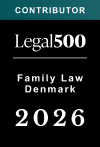
The world is getting more and more global with people moving abroad either permanently or more temporarily e.g. as expats. European countries are striving to attract global talent due to labor shortages in European countries with an aging population.
When it comes to bringing families to a new country this raises a complex situation in the event of a divorce or death while being abroad which many tends not to consider. The focus is often on the immigration or tax regulations, and on housing and schools.
However, in the event of a divorce or a death while being abroad it is often even more disturbing than if you were in your home country. Further, it can raise difficulties both relating to immigration matters, and whether you can get a divorce in the country you live in and if you plan to move on which jurisdiction is applicable to e.g. child maintenance, custody and visitation rights etc. Further, it also needs to be considered which jurisdiction will regulate the division of property or administration of an estate in the case of death.
What is the Danish matrimonial property regime?
Until January 1, 2018, Denmark had an unalterable principle regarding the law applicable to a spouse’s property regime. The husband’s domicile law (where he lived when the couple was married) would regulate the property regime during the marriage and in the event of a divorce or death. That wouldn’t change even if the married couple moved abroad and lived in another country for many years and no longer had an attachment to the husband’s old domicile country.
The rule created unintended results and further it differed from other European countries and EU regulation which Denmark had opted out on and therefore the rule was amended. Further, it was amended to ascertain gender neutrality in the rules.
According to the new regulations Danish property regime will be applicable if the couple both live in Denmark at the time of entering marriage.
If they don’t live in Denmark, it will be the country in which they both live at the time of entering marriage or shortly after.
If they don’t share a common residence at the time of marriage or shortly after it will be the country in which they both are citizens. If no such country exist it will be the country to which they both have the strongest attachment at the time of the marriage.
A transitional arrangement has been introduced by breaking with the unalterable principle, and came into force on January 1, 2023, according to which everyone who has lived in Denmark for 5 years after January 1, 2018, automatically will be subject to the Danish property regime.
Do I need a marital agreement?
Not everybody will necessarily see this as an advantage since the Danish property regime differs from rules in other countries, both in Southern Europe, the UK, the US, and Asia. If a couple don’t wish to subject to the Danish property regime this can be amended in a written agreement. Certain terms must however be met for the agreement to be effective.
A choice of law agreement concluded in Denmark, while both spouses are domiciled here, must be entered into a postnuptial agreement that complies with the Danish rules for entering into such agreement. A choice of law agreement entered into abroad is valid only if it is in writing, dated and signed by both parties, notwithstanding if it does not meet the Danish postnuptial agreement requirements.
It is not possible freely choosing which jurisdiction is applicable. It is only possible to choose the law of the country where you live, or the country of which you are a citizen when the agreement is concluded. However, transitional rules have been adopted enabling you to maintain that applicable law from before the law came into force shall continue to apply.
Foreign rules that are incompatible with basic Danish legal principles (ordre public) cannot be applied in Denmark.
How do I get assistance with International Family Law related to Denmark?
Holm/Thomsen Law will be pleased to assist you if you have any queries within international family law or are in need of assistance with a prenuptial or postnuptial agreement.
Further, if you have related immigration queries Holm/Thomsen Law has an in-dept knowledge on Immigration regulations as well.


